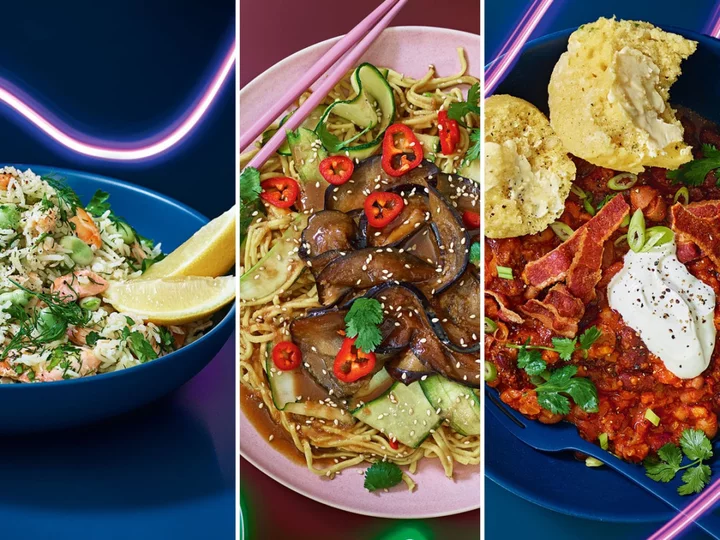
Tony Awards 2023 worst-dressed celebs: From Lupita Nyong'o's breastplate to Jordan Roth's scarlet cloak
Here are top-10 fashion blunders from 2023 Tony Awards red carpet
2023-06-12 16:21

Brittany: Girl, 11, from British family shot dead in France
The girl was reportedly playing on a swing in her garden when a neighbour shot her through a hedge.
2023-06-12 14:45

Food prices are squeezing Europe. Now Italians are calling for a pasta protest
High food prices are pinching households across Europe, where food inflation is outpacing other major economies like the U.S., Japan and Canada
2023-06-12 14:25

Barbecue Index Shows South African Food Inflation Is Easing
Food prices in South Africa continue to increase at a startling rate, although the pace of acceleration is
2023-06-12 14:21

Who is Bee Shaffer? Anna Wintour makes stylish appearance with daughter and son-in-law Francesco Carrozzini at Tony Awards 2023
Anna Wintour and her 35-year-old daughter Bee Shaffer made heads turn at the Tony Awards red carpet event
2023-06-12 14:20

Analysis-Price drop fears put a brake on European grocers' rally
By Joice Alves LONDON European grocers could exceed market expectations for earnings growth this year as they keep
2023-06-12 14:17

Shapewear is booming, and body image experts are worried: ‘It’s really dangerous’
In a number of scenes in 2001’s Bridget Jones’s Diary, our heroine – a thirtysomething singleton played by Renée Zellweger – squashes the skin of her lower torso into an array of Lycra shapewear, all in an attempt to make herself appear slimmer. When Hugh Grant’s Daniel Cleaver sets his eyes on her high-wasted, nude-coloured underpants in one memorable scene, Bridget blushes with embarrassment. “Well, hello mummy,” Daniel purrs. At the time of the film’s release, control shapewear – or tummy-tucking underwear designed to smooth its wearer – was marketed predominantly at people like Bridget, someone who was told by society she was “fat” or undesirable unless she had a flat stomach. Today, though, shapewear is branded differently, marketed to young women as a sexy, must-have fashion accessory. Shapewear products are not only promoted as stomach-smoothing fixes, but for anyone who wants a narrow waist or their figure to resemble a contoured, Kardashian-style hourglass. Skims, Kim Kardashian’s self-owned shapewear brand that she founded in 2019, sells viral sculpting bodysuits geared towards achieving this particular body shape. They start at £70. Since the launch of Skims, as with anything that a member of the Kardashian clan wears or makes, fast fashion knock-offs have swelled the market. Online retailer PrettyLittleThing, which has a murky track record of contributing to a harmful cycle of fast fashion, sells duplicates of the Skims viral bodysuit for around £20. They also sell waist trainers – a corset-style casing worn underneath clothes to aggressively teach your waist to be narrow – for just £12. “Doll cinch your waist in an instant with this waist trainer,” the item’s description reads. The product has boning to make it stiff and restrictive. Venture onto TikTok and you’ll find viral dresses with Spanx-style shapewear, designed to minimise the width of a person’s waist and accentuate their bottom, built into the clothing itself. While Skims is not solely responsible for this recent boom in shapewear, it has contributed to transforming how we view it – Bridget’s “granny pants” are now glamorous and aspirational. For the brand’s latest collection, for example, buzzy British singer-songwriters Raye and PinkPantheress were enlisted to promote it, along with viral Bronx rapper Ice Spice. The resulting campaign wouldn’t look out of place in the pages of Vogue. What this marketing tells us is that fashion isn’t just about the garments you wear, but the apparently malleable shape of the body on which they’re worn. Early shapewear emerged in the 16th century, not as a trend or body sculpting device, but for practical support. Karolina Laskowska, a lingerie designer and director of the underwear archive The Underpinnings Museum, tells me that the primary purpose of shapewear back then was to support the body much in the same way that a contemporary bra is made to support the breasts today. “A pair of stays [a corset style bodice] would have offered bust and back support for women who worked,” she explains. “These styles were more functional and supportive, rather than trend-driven.” The beginnings of the shapewear we see today were first seen in the Sixties, when the invention of Lycra, a synthetic-based elastic fibre, allowed for stretchier fabrics. What Laskowska dubs the grandparent of modern shapewear was the “Little X Girdle” by a British brand called Silhouette. “It was a turning point for a shift from traditional structured corsetry into elasticated shapewear,” she says. The item was a seamless, pull-on girdle – an elasticated corset extending from waist to thigh – and was eventually licenced to sell in over 32 countries as turnover increased exponentially. We then saw the evolution of more comfortable, everyday shapewear, like those made by Spanx, an American brand founded in 2000. They’re so uncomfortable, but they’re so afraid of what others will think about them due to their body size Victoria Kleinsman By contrast, modern shapewear is now geared towards sculpting the body to appear differently underneath clothes. And now, fast fashion is getting involved, too. But lingerie designers like Laskowska are increasingly worried about the consumer physically “hurting” themselves with badly made undergarments. “We’ve seen fast fashion adopt corsetry and shapewear trends but it’s not made to fit the human anatomy, since it’s made to be as cheap as possible,” she says. She adds that people could “injure” themselves with elasticated shapewear if they buy a size too small, meaning they could potentially restrict their blood’s circulation. Victoria Kleinsman, a self-esteem expert and body love coach, works with women between the ages of 13 to 60, and says that she’s seen how her younger clientele are feeling the pressure to wear shapewear in order to conform to the cult of thinness. Some clients have bought pantyhose with built-in cushioning to make the bottom look larger and perkier. Others will wear layers of shapewear to sculpt the body, particularly the waist and stomach, to look slimmer or flatter. To Kleinsman, wearing modern shapewear allows people to apply an “IRL [Instagram] filter” to their bodies. She speaks to women each day who are “crying” to her on Zoom calls because they’re worried about what their bodies look like. “It’s to the point when it’s boiling hot weather [but] they’re wearing spandex shapewear and tights, and they’re so uncomfortable, but they’re so afraid of what others will think about them due to their body size.” The expert fell into her line of work after she struggled with an eating disorder – she also wore a waist trainer when she was dealing with her own body image issues. “I would go to the gym wearing it because apparently you ‘sweat more’ and therefore lose ‘water fat’,” she says. “Which is b******! It’s physically painful to your physical body and even more painful to your emotional and mental well-being.” Kleinsman doesn’t think that this type of elasticated shapewear has anything to do with fashion and it should not be marketed as such. “It’s really dangerous,” she tells me. “Shapewear gives you a fake ‘confidence’ but then underneath it all when that comes off, then, who are you?” The popularity of Skims and their various knock-offs doesn’t seem likely to decline any time soon, but Kleinsman is hopeful that more women will soon have epiphanies about the shapewear revival. “Fatphobia and body image trauma is still the norm,” she sighs. “There has never been more [appropriate] a time for us to embrace our natural bodies.” Read More ‘The models are skinnier than ever’: Has London Fashion Week stopped caring about body diversity? Hostage to fashion: Margot Robbie’s Chanel problem speaks to a wider red carpet crisis Jeans shopping is still a total nightmare Kim Kardashian says Kris Jenner gets ‘sad’ thinking of how fame changed her family Kanye West and wife Bianca Censori cause confusion with Sunday Service outfits Chanel’s classic 1926 little black dress added to fashion exhibition in Scotland
2023-06-12 13:59

Magic of the microwave: Forget the oven with these three quick and easy recipes
Joining the Dent family in 1985, our microwave had somewhat of a bad start. It arrived, fresh out the box from Comet, in the midst of an argument. My mam had not greenlit the purchase of this cumbersome stainless-steel cube, with a vivid orange door, that Dad and I were loading onto her already packed kitchen worktop. She did not share our enthusiasm for this magical, space-age item we’d seen on BBC’s Tomorrow’s World and knew would take our snacking into the future. She was mainly outraged at the whopping £100 sum I’d cajoled Dad into spending. “I don’t trust it,” said Mam, reeling off a list of concerns, including microwaved innards, catastrophic explosions and partially cooked food giving us rampant salmonella. The truth was a little less exciting: I remember us loading the first maris piper inside, pricked all over with a fork, blasting it on HIGH for seven minutes, hoping for a crisp, fluffy jacket spud, only to find a rock-hard lump with a thin, waxy skin that hissed and spat from the holes. “See? Useless!” said Mam. My dad and I were sheepish. But as the weeks went on, Mam’s attitude to the microwave softened. For a start, it was saving her a fortune on gas as we almost stopped using the hobs for tinned spaghetti, soup, baked beans, tinned custard. Plus, the defrost button meant we now had access to all those mystery items she’d deep-frozen months back. Potato became a thing of joy as we discovered “micro-mash” (real potato, already peeled, mashed and frozen). Mam and Dad worked, so now my brother Dave and I could rush home from school and warm up glamorous microwave meals we’d begged Mam for on the big Friday shop. Macaroni cheese in a plastic tray! Microwave chips in a box! We learned how to heat food thoroughly, stopping halfway to give it a stir, before lazing on the couch, watching Miami Vice with our microwave chicken chow mein, feeling like we were fully living the dream. Nowadays, I try to limit my intake of such shiny-packeted E-number-filled joys; but still, I can’t live without my small, sleek, silver microwave. Life is too short to use a pan for frozen peas or spaghetti hoops; and how would I live without a quick 800W blast to thaw and separate veggie sausages before hurling them in the air fryer, or to defrost frozen mince before whipping up a quick chilli? Some foodie types are snobbish about the microwave; I see it as a loyal friend who has had my back for over 30 years Watt’s on the menu? Make the most of your microwave to conjure up clever meals that save on time and energy use. These ingenious recipes are from Ocadolife. Easy perfect rice with smoked trout and broad beans If you have trouble boiling rice on the hob, you’re going to love this method. It’s super-easy and yields flawless results every time. Here, it’s teamed with a summery combination of pink fish, vibrant herbs and a zingy dressing. Serves: 4 Hands-on time: 15 mins | Total time: 20 mins, plus standing (based on an 800W microwave at full power) Ingredients, available from Ocado: 250g basmati rice, rinsed 500ml hot vegetable stock 300g frozen broad beans Zest and juice of 1 unwaxed lemon, plus extra wedges for squeezing 1 garlic clove, crushed or grated 2 tbsp olive oil handful of flat-leaf parsley, roughly chopped Small bunch of dill, roughly chopped 2 x 100g packs M&S Scottish Loch Trout Flakes Method: 1. Put the rice in a large microwave-safe bowl. Pour the stock over the rice; stir well. Cover (if using microwave-safe wrap, pierce to let the steam escape); sit the bowl on a microwave-safe plate to catch drips and microwave for 12 mins. Remove; leave to stand, covered, for 10 mins. 2. Meanwhile, put the broad beans in another microwave-safe bowl with a few splashes of water, cover with a microwave-safe plate and blast for 2 mins. Remove, tip into a colander and refresh under cold running water until cooled; drain well. 3. Stir the broad beans into the rice, with the lemon zest and juice, garlic, olive oil, most of the herbs and plenty of seasoning. Fold through the trout. Divide between 4 plates and scatter over the remaining herbs. Serve with lemon wedges for squeezing. Per serving: 428cals, 1 veg portion, 10g fat (2g saturated), 22g protein, 59g carbs, 2g sugar, 7g fi bre, 1.7g salt Saucy supper silky aubergine and courgette noodles Microwaving cooks food from the inside out, so you can say goodbye to spongy aubergines and hello to beautifully soft flesh that soaks up the marinade as it cooks. Serves: 4 Hands-on/total time: 20 mins (based on an 800W microwave at full power) Ingredients available from Ocado: 2 aubergines, each cut lengthways into 8 pieces 100g egg noodles 1 large courgette, peeled into ribbons Large handful of coriander, roughly chopped 1 red chilli, sliced 1 tbsp sesame seeds, toasted For the marinade: 4 tbsp soy sauce 3 tbsp rice wine vinegar 1 tbsp sesame oil 2 garlic cloves, crushed or grated 3cm piece ginger, grated 1 tbsp miso paste 1 tsp caster sugar Method: 1. Combine all the marinade ingredients in a large microwave-safe bowl. Add the aubergine; toss to coat. Cover (if using microwave-safe wrap, pierce a couple of times to let the steam escape); microwave for 12 mins, stirring halfway, until cooked through. 2. Meanwhile, put the noodles in a heatproof bowl and cover with boiling water. Leave to stand for 3 mins or until tender. Put the courgette ribbons into a sieve, then drain the noodles over them – the residual heat will soften the courgette slightly. 3. Divide the noodles and courgette between 4 plates. Top with the aubergines, spooning over any remaining sauce. Scatter over the coriander and chilli, sprinkle with the toasted sesame seeds and serve immediately. Cover leftovers and chill for up to 2 days. Reheat in the microwave until piping hot. Per serving: 357cals, 1 veg portion, 5g fat (1g saturated), 13g protein, 60g carbs, 9g sugar, 9g fibre, 3.4g salt, £1.37 per portion Smoky bean chilli with cornbread and crispy bacon With no frying odours or splattered grease, bacon in the microwave is almost too good to be true – especially teamed with this delicious chilli and cheesy cornbread. Serves: 4 Hands-on time: 20 mins | Total time: 30 mins (based on an 800W microwave at full power) Ingredients available from Ocado: Six rashers dry-cured smoked streaky bacon For the cornbread: 2 tbsp unsalted butter, plus extra for spreading (optional) 5 tbsp plain flour 5 tbsp fine cornmeal or polenta 1 tsp baking powder 1 tbsp caster sugar 2 medium eggs, lightly beaten 6 tbsp natural yoghurt 1 green chilli, finely chopped (optional) 50g cheddar, finely grated For the chilli: 150g soffritto mix (we used Cook With M&S Frozen Soffritto Base, defrosted) 1 garlic clove, crushed or grated 2 tsp ground cumin 2 tsp smoked paprika 1 tsp dried oregano 1 tbsp olive oil 2 x 400g tins mixed beans, drained (splash of liquid reserved) 350g passata To serve (optional): Soured cream Handful of coriander, leaves picked 2 salad onions, chopped Method: 1. For the cornbread, put 1tbsp butter into each of 2 large mugs (preferably straight-sided). Microwave for 20 secs or until melted. Carefully swirl the butter around in the mugs so it greases the sides, then tip the excess out into a mixing bowl. Set the mugs aside. 2. Add the remaining cornbread ingredients to the bowl, reserving a little of the grated cheese. Season well, then stir until combined. 3. Divide the mixture equally between the 2 mugs and sprinkle over the remaining cheese. Microwave them separately for 1½-2 mins or until risen and springy. Run a knife around the edge of the cornbread to loosen; turn out onto a wire rack to cool. 4. For the chilli, put the soffritto, garlic, spices, oregano and oil into a large microwave-safe bowl. Cook for 3 mins, stirring halfway. 5. Add the beans (and a splash of liquid), passata and seasoning to the bowl; stir well. Cover (if using microwave-safe wrap, pierce a couple of times to let the steam escape), and cook for 5 mins, stirring halfway. Leave to stand while you cook the bacon. 6. Put 2 sheets of kitchen towel on a microwave-safe plate and lay the bacon in a single layer. Cover with another sheet of kitchen towel. Microwave for 1 min, then check to see if it’s crisp and starting to curl. If not, continue cooking in 20-sec bursts, being careful not to burn it. Break into shards. 7. Uncover the chilli (open it away from you to avoid the steam) and ladle into bowls. Top with a dollop of soured cream, the coriander and salad onions (if using), and the bacon. Serve with the cornbread, buttered if you like, for scooping. Leftover chilli will keep covered and chilled for 3 days. The cornbread is best eaten on the day of cooking. Per serving: 613cals, 2 veg portions, 29g fat (12g saturated), 30g protein, 54g carbs, 10g sugar, 9g fi bre, 2g salt, £1.60 per portion Read More How to shop for and cook Japanese food at home like a pro Forest Side, review: Cumbrian produce elevated to Michelin-starred proportions Showstopping BBQ main dishes for a hot grill summer 7 TikTok food hacks that actually work Saltie Girl in Mayfair will make you happy as a clam – as long as you can afford it Chef Ravinder Bhogal: Vegetables are the secret to saving money
2023-06-12 13:59

How to shop for and cook Japanese food at home like a pro
The dinner rotation is an unspoken, yet essential schedule. Most of us have five or six reliable recipes tucked away in our back pockets, ready to be pulled out at a moment’s notice. Sometimes this means cooking the same dishes week in, week out. Venturing outside this routine should be an exciting prospect. Maybe you’ve been inspired by a travel documentary or a new cookbook caught your eye. It doesn’t look that hard, right? But hunting down the right ingredients can feel like a minefield when you don’t really know what you’re looking for or even where to find them. Shopping well is crucial for success in the kitchen. God only knows the number of times I’ve come home with the wrong thing or given up because I was overwhelmed by the supermarket aisles. What if I end up wasting money on a new meal that turns out catastrophic? Some cuisines are more daunting than others. Japanese food has such a reputation for perfection that the idea of making anything other than a katsu at home terrifies me. But it wouldn’t be so scary if I had a real-life expert to walk me through the supermarket shelves, show me what to look for and demonstrate that I could indeed be churning out beautiful sushi, delicious broths and other Japanese dishes from my humble kitchen. Enter: cookbook author and teacher, Atsuko Ikeda, who has offered to take me to an Asian cash and carry to teach me how to shop for Japanese ingredients. We meet at Tazaki, a major distributor of Asian ingredients in the UK that has a warehouse in North Greenwich. It was previously owned by SeeWoo but was acquired by Tazaki last year and is currently in the process of revamping stock. However, it still carries just about everything you need to get started on a Japanese culinary adventure. Ikeda, who has authored three cookbooks on Japanese small plates, comfort food and sushi, is a frequent visitor. We begin by perusing the fresh ingredients, like daikon (white winter radish), whole lotus root and mustard greens. The whole lotus root can be sliced thinly and fried to make crispy lotus chips, while the snow-white daikon can be grated into sauce or cubed and added to soups. But we’re starting simpler. Ikeda picks up shimeji mushrooms, small round cap fungi with medium-length stems that grow from a single base. These have an earthier flavour and are denser in texture than regular button or chestnut mushrooms, which means they retain their size and shape a little better. Spring onions, avocado and carrots also make it into the basket, common vegetables that can be found in any supermarket. We move onto carbs and delve into the rice section. As Ikeda is teaching me how to make sushi later, she explains that it is made with Japanese short-grain rice; it has a more glutinous, starchy texture than long-grain rice, which is more popular in the UK. This starchy quality of short-grain rice makes it stickier, an essential feature to make sure sushi rolls and nigiri bites don’t fall apart. A trusted brand for most Japanese ingredients, including sushi rice, is Yutaka, which can be found almost anywhere – I’ve seen it stocked in my local fishmonger. Plenty of other brands abound, with some supermarkets even providing their own brand products, but Ikeda’s recommendation goes straight into my basket. She points out a variety of noodles, and we’re talking much more than udon. There are bouncy shirataki noodles, almost transparent noodles made from konjac yam that can be eaten hot or cold. You can purchase frozen ramen noodles if you’re experimenting with making your own ramen, but Ikeda winks as she tells me she usually just goes to her favourite ramen shop when she’s craving it. Soba noodles, which can be bought dried, are perfect for the summer when tossed into a cold peanut sauce with an assortment of vegetables. The list goes on and on, but Ikeda reassures me that most noodles are versatile and it mainly depends on what type of texture you’re going for rather than flavour. Next is the condiments aisle, where miso resides (can miso be considered a condiment? I’m not so sure). Miso is, of course, a must-have staple. Ikeda points out three types: white miso, sweet rice miso and barley miso. Later, when we taste them, I’m surprised to learn how vastly different they taste from one another. The white miso, which is the most common type used in recipes, has a slight tang and a savouriness that makes your mouth water, while the barley has a deeper, maltier flavour that is mcuh more comforting. I highly recommend buying different types to taste for yourself. Ikeda also introduces me to yuzugosho, a spicy, tart condiment containing the yuzu fruit and fiery green chillies. It brought a tear to my eye, both from the heat and delicious flavour. Ikeda also teaches me that most commercial wasabi contains more horseradish than wasabi, so buyer beware: if you’re seeking the real deal, you may have to be prepared to shell out more money than you initially think. Some brands are 100 per cent horseradish, marketed as wasabi, so checking the label is essential. The same goes for mirin, a Japanese sweet rice wine which varies in alcohol content. A good rule of thumb is that the cheaper the mirin, the lower the alcohol content. Soy sauce is another staple for most Asian cuisines, but there are differences. Ikeda prefers to use tamari soy sauce, which is thicker and, I find, not as intensely salty as the soy sauce you usually get in tiny fish-shaped plastic bottles from takeaways. At home, I’m a Kikkoman soy sauce fan, but Ikeda recommends Yutaka’s organic tamari soy sauce for a more mellow, sweeter flavour. In terms of proteins, it depends on what dish you want. We’re focused on fish, particularly sushi-grade salmon, which you can buy from Tazaki or most fishmongers. This is where I’m especially nervous, because it’s easy to get the cut wrong. However, knowledgeable fishmongers are your best friends when it comes to choosing the cut, so ask plenty of questions. Ikeda shows me how to slice the salmon for different types of sushi rolls and nigiri, as well as how to steam the fish in a baking parchment parcel, slathered in miso and accompanied by the shimeji mushrooms we’d purchased earlier. You can also add fish roe or masago caviar to your Japanese dishes. The bright orange spheres add a unique saltiness and a satisfying texture to sushi, but can also be used to top rice dishes or stirred through Japanese-inspired pastas. A reliable brand is Elsinore, which can be found in Waitrose. I still find the idea of making sushi daunting, but the supermarket aisles no longer feel so intimidating now that I have a clearer idea of what to look for. It reminds me of how fun it is to try something new in the kitchen and, armed with cookbooks from the experts, the delicious results will keep me coming back for more. Read More Grace Dent’s quick and easy recipes that only require the microwave Forest Side, review: Cumbrian produce elevated to Michelin-starred proportions Showstopping BBQ main dishes for a hot grill summer 7 TikTok food hacks that actually work Saltie Girl in Mayfair will make you happy as a clam – as long as you can afford it Chef Ravinder Bhogal: Vegetables are the secret to saving money
2023-06-12 13:58

German shepherd wounded in Ukraine gets new start as Hungarian police dog
A German shepherd wounded during a rocket attack in northeastern Ukraine is now training with the police department in Hungary's capital
2023-06-12 10:50

Microsoft Announces Forza Motorsport Will Drop on October 10
Microsoft announced at Summer Game Fest on Sunday that Forza Motorsport is set to land
2023-06-12 09:57

Over 60,000 Android Apps Found Loaded With Adware
At least 60,000 Android apps carried adware in the last six months, according to the
2023-06-12 09:55
